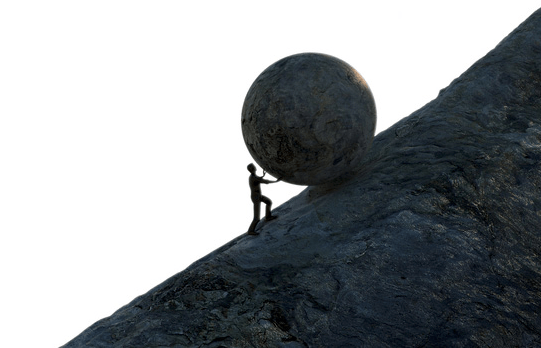We're All in Fractal Microcults
We now have an infinite number of ways to strongly disagree with someone

I think a lot about happiness and how to achieve it.—both as individuals, and as societies. I can think of nothing that’s as important, once the more tactical issues are out of the way.
I believe I’ve come into some ideas recently, spawned by reading as usual, that I hope have brought me closer to the truth.
That truth is something like happiness being based on overcoming.
"Overcoming what?", you might ask.
Well, that’s the thing. Evolution wasn’t super specific on that point. And evolution is absolutely the one who’s handing out the happiness trophies. We experience happiness, at the most basic levels, from achieving two things:
Survival
Reproduction
The highest happiness comes from almost failing at those, and then succeeding. And the moment you succeed, evolution rewards you as only it can: by filling your brain with a deep and powerful happiness.
I’m just so happy to be alive!
Indeed. Nothing’s better, if you’ve recently faced death and overcome it.

Similarly, if you’re trying to get with a person you love—romantically, sexually, whatever—and you finally make it happen, that too produces profound happiness. Another great example is reproduction in the more literal sense, where you’re a couple trying to have children and you’re somehow unable. Then, once you finally get pregnant, or the baby is born, there is just nothing like it.
The magnitude of the struggle, and the pain it causes, equates to the magnitude of the happiness once you overcome it.
So the key point here is that struggle is required for happiness. Not philosophically, or religiously, or due to any other other-worldly power. It’s our biology, crafted by evolution, that makes it so.
So that’s the situation with individuals. What about civilizations? How should we create organizations and governments that produce or enable the maximum amount of happiness?
Again I think he answer lies in overcoming.
But then we have to ask once more, "Overcoming what?", and with societies the answer is a bit more elusive. It used to be that happiness in a large society was still tied pretty strongly to the same two challenges: survival and reproduction.
Early society was essentially a large group of people going through that struggle together but individually, and if they didn’t die, and were able to have kids, then they were the lucky and happy ones. They survived the winter, or kept the invaders out of the town, and were able to have kids that didn’t die of disease or hunger.
Those things seem simple, but so many people died from war, starvation, and sickness that just being alive and having a family was the pinnacle of bliss.
But then technology came along, and it became easier to have children that lived, and it became less common for people to die of disease. But it was still hard to survive because you had to make a living for yourself. If you live in society, you need money for food, shelter, safety, transportation, education, and all the things that allow you to raise a family.
So then we have the idea of a profession, that, if you do it well, grants you access to those things. So you would do work, which was a form of struggle, that granted you tokens (money) with which you could purchase your happiness (providing for the needs of your family).
I’m not attacking all of what Marx said, by the way, because I think a big part of his point was that we need to find a new way to be happy when machines can provide for our basic needs.
That all seems to check out based on the hypothesis that happiness comes from overcoming struggle. And work is just a proxy for it, one step removed. Strangely, it also quickly addresses the flaw with various implementations of Communism, i.e., you can’t simply give people things they need to produce happiness because you’re omitting the essential part of overcoming a challenge which (poverty and suffering notwithstanding) they need to experience themselves to receive the benefit.
That brings us to modern day, where we have a unique problem forming with achieving happiness.
The new problem is not that we cannot overcome the challenges that are put in front of us, but rather that there are no clear challenges to be had.
In a world where you won’t actually die from exposure to the elements or from sickness (because the government will take care of most of your needs) the principle threat to happiness in the modern and approaching world is a shortage of meaningful work for people.
No starvation? No struggle.
No shortage of mates to have kids with? No struggle.
No meaningful work? No struggle.
Since we’re not likely to reintroduce (at least on purpose) the first two challenges into a modern society, we’re left with meaningful work as our only option.
And that work is precisely what is being removed by technology, computers, automation, and increasingly—artificial intelligence.
Experts disagree on the speed at which this is happening, and whether blue or white collar jobs will go first. I think the answer is fairly straightforward: blue collar jobs will go first if they can be automated like factories (such as manufacturing plants), and white collar jobs will go first that can be done better by AI (such as day traders and fund managers). But many of both types of jobs will remain, such as plumbers and artists, for quite some time.
Anyway, the point is not the exact speed that this is happening, or who it will affect first. The point is that it is happening, and faster than most think. I’m reading Player Piano right now, which is a stunning book by Kurt Vonnegut. His first book, actually. He writes:
To the people who were going to be replaced by machines, maybe. A third one, eh? In a way, I guess the third one’s been going on for some time, if you mean thinking machines. That would be the third revolution, I guess—machines that devaluate human thinking. Some of the big computers like EPICAC do that all right, in specialized fields.

Automatic Pianos Are Only Good for Non Pianists
He wrote that in 1952, and I can think of no more applicable text to what we’re facing now with machine learning and other forms of AI as they relate to human work.
I discovered in some recent reading that there has been a fundamental difference in the way Americans approach happiness vs. how Europeans approach it.
Europeans seem like they’re trying to reduce reduce their work and maximize their leisure. And Americans have evidently been obsessed for quite some time with working. More work, longer hours, more responsibility, more promotions, higher pay, etc. It’s been something Europeans have always judged Americans harshly about, even if some also admired it.
Get a weekly breakdown of what's happening in security and tech—and why it matters.
Many people describe this attributes as industriousness. The drive to work. The drive to improve at the work you do. Maybe it’s differentiated from work ethic by adding creativity and ambition to the mix, as opposed to just showing up consistently and as much as possible to do the same thing.
Either way, this industriousness and work ethic seems to be in some way tied to America’s success. It seems like those who came here were the most industrious throughout the world. They were the ones who were attracted to that marketing message, and did what they had to to get here.
And the country thrived—especially so in the late 40’s and 50’s after that same drive helped win the war, and our people came home to enjoy Evolution’s rewards of survival and reproduction.
But now the jobs, the threats to basic life, and (hopefully) the wars, are going away, and with them go the possibility for sustained happiness.
Boredom is the unpleasant tension that’s neither struggle nor happiness.
Many, including myself, have hailed Universal (or Basic) Income to be a relief from this unhappy state of being. But I think there’s a lot of confusion here with regard to what problem we’re trying to solve. Here are some problems that might have vastly different solutions:
There are no jobs for people who want to work.
Low-end work saps time and energy that could be spent on more creative pursuits.
People have no money for basic necessities, and thus need some type of assistance.
That’s why this is confusing. Some people are talking about Basic Income replacing welfare for the third problem. Others are talking about it providing a way to give people their necessities so that they can work on something they actually care about, and that can provide more value to the world.
There’s a significant literature on this. Some of the effect is here simply not being any good work for them to pursue, but some is actually people losing their desire to work entirely.
The problem with believing that giving people money will make them more creative is that it implies the person wants to do something else with their time. It implies, in other words, industriousness, which might not be a solid assumption to make for everyone. Especially with growing numbers of adults simply deciding to leave the job market completely, or not enter it at all.
My takeaway from all this is that the main challenge seems to be figuring out how to build a society that can keep people striving. But what will they be striving for? Where is the struggle that we need to overcome?
I think the best way to view this is in stages:
The first stage was survival and reproduction.
The second stage was work and utility.
And the third stage will be discovery and art.
I think we’re coming to the end of the work and utility phase. There will still be plenty of work to be done, of course, and that work will still be respectable, but increasingly we’ll transition away from a time where people just mechanically performed a task that had little meaning on its own. Those tasks will be left to the robots, computes, and algorithms.
In the next stage we’ll be free to pursue a new struggle, which is finding a way to maximize the enjoyment of others.
Finding ways to colonize the solar system. Finding ways to reach other star systems. And preparing for catastrophic events such a global diseases, asteroids, magnetic field changes, and even the extinguishing of our sun. And in the meantime, we’ll be creating stories, drawing, painting, poems, etc.
Many of us will be living inside virtual realities with their own new sets of Evolution-approved struggle loops that keep people happy. We’ll be princes and princesses, superheroes and super-villains, good guys and bad. But these proxies may ultimately prove hollow unless we can directly link that reality to our own in a tangible and sustainable way.
For people on the outside not engaging in an Alternative Meaning Loop like a virtual reality universe, the only path will be discovery and art.
Importantly, this path for meaning attainment is even further separated from Evolution’s ideal than Work & Utility, so it’ll likely be less sticky and less rewarding without being constantly reinforced by society, peers, and possibly government.
People will be socially rewarded for being scientists, astronomers, teachers, musicians, story-tellers, etc. Magnifying happiness for other humans will be the highest calling and the highest honor, followed closely by more supporting roles that enable those pursuits.
All of this depends on people believing themselves to be in a struggle. It used to be a struggle to survive, then it was a struggle to do well in society, and soon it’ll be to discover. But we cannot let ourselves be convinced that struggle is bad, or that the goal is to remove it completely.
Because removing that, unfortunately, also removes our ability to experience true happiness. Any civilization looking to create policy must keep this foremost in mind: the primary goal of any incentive system must be to keep people striving and overcoming. The nature of the struggle will change, but the fact that there’s a challenge and an impetus to overcome it must remain constant.